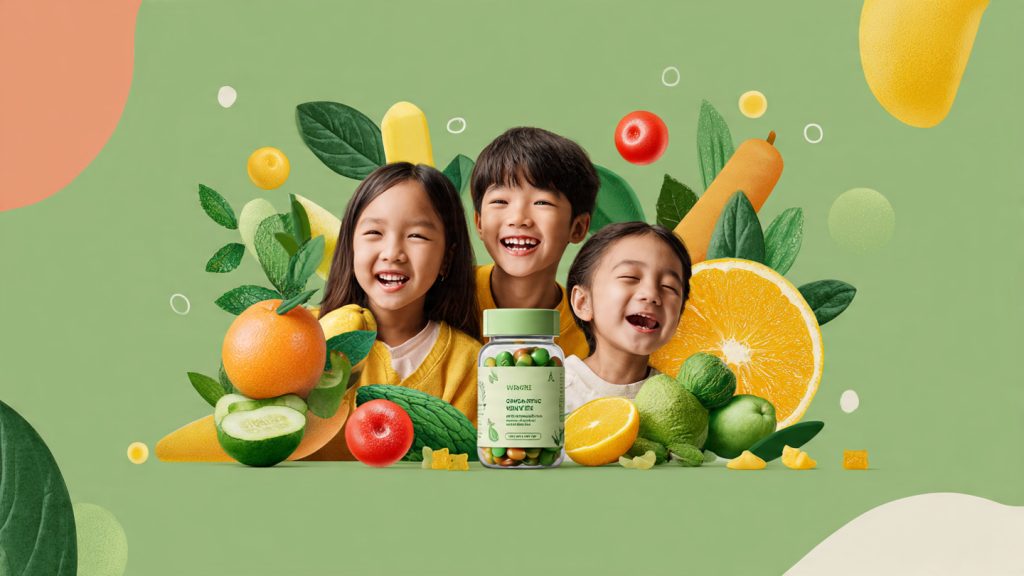
Why Organic Multivitamins for Kids Matter
As parents and caregivers, there’s nothing more important than giving children a strong foundation for growth, health, and development. In an ideal world, a child’s diet would provide all the vitamins and minerals their body needs. But in reality, even with healthy meals, kids’ nutrition can fall short. Picky eating, limited food variety, busy family schedules, and the rising cost of fresh, diverse produce all make it difficult to consistently meet every micronutrient need.
Organic multivitamins for children serve as a smart safety net. They’re not a substitute for good food, but a supplement helping to fill in nutritional gaps, especially in vulnerable contexts. When made from organic sources, these supplements also minimize children’s exposure to synthetic additives, heavy metals, and chemical residues, aligning with a more natural and cautious approach.
Key Benefits of Organic Multivitamins for Children
1. Supporting Optimal Growth & Development
Children are in a constant state of physical and cognitive growth. Their bodies need a steady supply of micronutrients — like vitamin A, iron, zinc, iodine, and others — to support brain development, bone strength, immune function, and more. Unfortunately, deficiencies are common; for instance, a significant number of children globally suffer from deficiencies in vital micronutrients. PubMed+2MDPI+2
In places like Pakistan, for example, research has found alarmingly high levels of zinc and vitamin A deficiency among school-age children. PMC+1
An organic multivitamin helps ensure children get a reliable daily intake of essential micronutrients, supporting healthy development.
2. Boosting Immune Resilience
Kids frequently face infections, especially during their early years, and micronutrients play a pivotal role in keeping the immune system strong. Nutrients like vitamin A and zinc are particularly important in defending against infections. World Health Organization+1
Supplementing with a high-quality, organic multivitamin can help enable better immune resilience, especially when dietary intake is inconsistent.
3. Safe & Cleaner Nutrition
One of the biggest draws of organic multivitamins is the reduced exposure to synthetic chemicals, artificial preservatives, and pesticide residues. For parents who prioritize clean-living and want to minimize potentially harmful exposures, organic formulations offer peace of mind.
4. Supporting Long-Term Health
Micronutrient deficiencies in childhood don’t just affect the here and now. They can have long-term implications for health, education, and well-being. Research shows that lack of vital micronutrients during early development can impair physical growth, cognitive performance, and immune function. PubMed+2MDPI+2
By supplementing wisely, parents can contribute to both the immediate and future health of their children.
When and Who Might Need an Organic Multivitamin
Not every child needs a daily multivitamin, but certain situations make supplementation more beneficial:
- Picky eaters: Kids who regularly reject fruits, vegetables, or whole foods may not achieve a balanced nutrient intake.
- Limited food variety: Families with restricted access to fresh produce or those relying on more processed foods may lack dietary diversity.
- High-risk environments: Children in areas with known micronutrient deficiencies, or those exposed to environmental stressors, may benefit from supplementation.
- Rapid growth phases: During growth spurts, children’s nutritional needs surge; a multivitamin acts as a supportive buffer.
- Special dietary patterns: Vegan or highly restricted diets might omit certain nutrients; an organic multivitamin can help fill those specific gaps.
That said, global health authorities don’t always recommend universal multivitamin use for all children. For instance, according to a guidance document from WHO/PAHO, routine multivitamin supplements aren’t always necessary for healthy children unless they have risk factors for deficiency. Pan American Health Organization
It’s important to consult a pediatrician or nutritionist before starting a daily supplement, to make sure it’s appropriate and safe for the child’s age, diet, and health status.
Choosing the Right Organic Multivitamin for Kids
When selecting an organic multivitamin for a child, these factors can guide you:
- Certification & quality: Opt for supplements that are certified organic by recognized bodies. This helps ensure minimal synthetic contaminants.
- Appropriate dose: Children’s needs differ widely by age — a toddler’s multivitamin should not be the same strength as one for a pre-teen.
- Form & delivery: Gummies, chewables, or liquids may be more acceptable for younger children, while older kids might take tablets. Choose a form your child can reliably consume.
- No unnecessary additives: Prefer clean formulas that avoid artificial colors, flavors, sugars, or excessive binders.
- Trusted brand: Use supplements from reputable companies that do third-party testing for quality and purity.
How to Use Organic Multivitamins Wisely
To maximize benefits and maintain safety:
- Take daily: For consistent coverage, make taking the multivitamin part of the daily routine — for example, with breakfast.
- Use with meals: Some nutrients absorb better when taken with food, and it reduces stomach upset.
- Monitor diet: Continue encouraging a varied, balanced diet. Supplements should complement, not replace, nutritious food.
- Review periodically: Periodically check in with your child’s doctor or pediatric nutritionist to monitor whether the supplement remains necessary, especially as their diet or health changes.
- Store safely: Keep out of reach of younger children, especially with chewables or gummies, to reduce risk of overdose.
Addressing Common Misconceptions
- “Multivitamins are candy for kids.” Some gummy multivitamins taste sweet, but quality organic versions do not rely heavily on sugar or synthetic colors.
- “If I give a multivitamin, I don’t need to worry about their diet.” Wrong. A multivitamin is insurance — not a substitute for whole foods. Real food provides not just vitamins but fiber, healthy fats, and phytonutrients.
- “More is better.” Too much of certain vitamins or minerals can be harmful. Follow recommended dosage and don’t double up with other supplements unless advised by a healthcare provider.
The Big Picture: Why It’s Worth Considering
Growing children are on an incredible journey — from crawling toddlers to active school-goers to confident pre-teens. Their bodies and minds need reliable support every step of the way. An organic multivitamin for kids is not a “magic pill,” but it’s a thoughtful, proactive way to guard against hidden nutritional gaps.
For families who value clean, wholesome nutrition — who want to minimize exposure to synthetic additives — an organic multivitamin provides a smart, science-informed safety net. Especially in regions with high rates of micronutrient deficiencies, or in households where food variety is limited, this supplement can play a meaningful role in supporting health, energy, growth, and immune resilience.
Used wisely — in consultation with a pediatrician — an organic multivitamin helps children not just survive, but truly thrive, laying a foundation for a healthier future.
References
- Global prevalence and impact of micronutrient deficiencies in children. PubMed
- Micronutrient supplementation and fortification interventions: Impact on child development. MDPI
- Micronutrient deficiencies among children in Pakistan (school-going & preschool). PMC
- WHO guidelines on micronutrients and supplementation for children. World Health Organization+1
- Nutrient needs for child growth from MDPI analysis. MDPI
- National Nutrition Survey – micronutrient deficiencies in Pakistani children.



